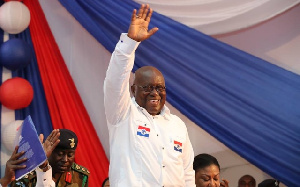- General News
- Crime & Punishment
- Politics
- Regional
- Editorial
- Health
- Ghanaians Abroad
- Tabloid
- Africa News
- Religion
Politics of Monday, 19 October 2020
Source: 3news.com
NPP capable of winning presidential election in Central Region – Research
Using statistical model based on analysis of election results since 1992, the Governance Research Bureau has stated that the New Patriotic Party’s presidential candidate has the potential to win in a majority of constituencies in the Central Region in the December 7 election.
Dr. Ezekiel Nortey, Resource Person of the Bureau, explained that the party’s estimated average votes in the Region over the years had been 463,415, representing 49.66 percent and the model projects that their votes could be increased to 471,378 votes.
Speaking on the Election Watch segment of Election 360 on TV3, Dr Nortey said the party’s victory would be possible if they win in their nine strongholds of Agona West, Assin Central, Assin North, Assin South, Awutu Senya East, Effutu, Heman Lower Denkyira, Upper Denkyira East and Upper Denkyira West.
He said the party should also try as much as possible to win in at least two of the following constituencies: Abura Asebu Kwamankese, Asikuma Odoben Brakwa, Awutu Senya West, Cape Coast North, Cape Coast South, Cape Coast Central, Gomoa East, Gomoa West, KEEA, Mfantseman and Twifo Atti Morkwa.
He said the party should also try as much as possible to win in at least two of the following constituencies: Abura Asebu Kwamankese, Asikuma Odoben Brakwa, Awutu Senya West, Cape Coast North, Cape Coast South, Cape Coast Central, Gomoa East, Gomoa West, KEEA, Mfantseman and Twifo Atti Morkwa.
On the performance of the National Democratic Congress (NDC), he said their estimated average votes in the Region had been 445,424 representing 47.73 which can increase to 453,730 but still short of their opponent’s average, so they have a herculean task ahead of them.
Dr. Nortey, also Senior Lecturer in Statistics and Actuarial Science at the University of Ghana, Legon, said the party can be assured of victory in the Central Region if they win in their strongholds of Agona East and Ajumako Enyan Essiam, as well as, at least 10 out of the 11 potential swing constituencies in the Region.
These are Abura Asebu Kwamankese, Asikuma Odoben Brakwa, Awutu Senya West, Cape Coast North, Cape Coast South, Gomoa Central, Gomoa East, KEEA, Mfantseman, and Twifo Atti Morkwa.
Another Resource Person of the Bureau, Dr. Kwame Asah-Asante, who spoke on factors that influence choice of voters, observed that studies had shown that in a number of regions, political parties themselves are key influencers as people wanted to be associated with winning parties and this accounted for the poor performance of independent candidates over the years.
Some of the factors, according to the studies, included preference of voters for God-fearing, honest and experienced candidates, as well as party tradition, he added.
On the unpredictability of results in the swing regions, he attributed it to the existence of different political identities which did not vote in bloc but responded to campaign messages differently.
Dr. Asante, who is also Senior Lecturer in Political Science at the University of Ghana, Legon, advised voters not to be deceived by campaign propaganda in which celebrities are employed to endorse political parties and candidates because such advertisements conceal more than they reveal.
Entertainment










